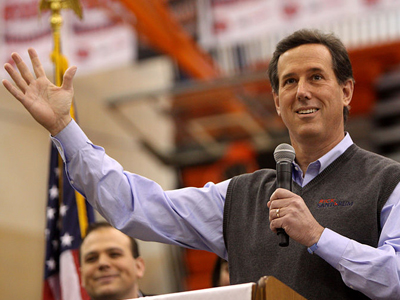Satan and American Exceptionalism
What Santorum's Satan comments reveal about his flawed conception of America—and how they link him to the liberal interventionists.
 Even the least cynical campaign watcher might tire of seemingly rabid pundits waiting for another verbal gaffe or scandal to hit the wires. But what if the skeleton emerging from the proverbial closet was the devil himself?
Even the least cynical campaign watcher might tire of seemingly rabid pundits waiting for another verbal gaffe or scandal to hit the wires. But what if the skeleton emerging from the proverbial closet was the devil himself?
The web was on fire last week with a speech unearthed from 2008 in which Rick Santorum, addressing students at a very conservative Catholic university, explained that he saw Satan at war with America. The pundit class immediately pointed to this as yet more evidence that Santorum is out of step with the twenty-first-century voter—nevermind that recent polls indicate that large majorities of Americans still profess belief in the devil.
Asked to respond, Santorum sought to downplay the speech, simply stating that he believes "in good and evil." Satan and the demonic—and even the notion of evil—aren't part of polite elite discourse anymore, so perhaps it was unsurprising that media commentators found their use shocking. But among all the evocations of horned creatures and 1970s horror movies, they missed something far more important than a tired fault line of the culture war. Santorum's argument relies upon a vision of the country's history that has become an article of faith among many neocons and liberals: America as an inherently exceptional nation.
It is because of this special status, Santorum argued, that "the Father of Lies has his sights on what you would think the Father of Lies would have his sights on: a good, decent, powerful, influential country—the United States of America." What Catholic University professor Claes Ryn warned has become "America the Virtuous" stands alone, unique in history as a target for evil forces. "If you were Satan," Santorum asked, "who would you attack in this day and age? There is no one else to go after other than the United States and that has been the case now for almost two hundred years, once America's preeminence was sown by our great Founding Fathers."
No reasonable observer would argue against the proposition that the United States is exceptional in an empirical sense, still unmatched in its raw power and influence over other nations. But Santorum's America is an abstraction, a country untainted by evil, from its very origins set apart from the world. It is as if the entire continent were inside the garden of Eden and therefore without sin.
The famous seventeenth-century image popularized by the rhetoric of Ronald Reagan, puritan leader John Winthrop's "city upon a hill," is thus distorted by Santorum. This image of America becomes less like a lighthouse and more like a menacing flotilla, what some scholars see as a longstanding tension between the nation as "exemplar" and an imperial power justified by special providence. In this view, America is no longer an earthly city—distinguished but susceptible to a fall—but closer to a heavenly one, entitled to issue moral commandments to less upstanding provinces.
Santorum's model for America is the nation that formulates a foreign policy not based on a sober assessment of its national interests but instead goes in search of monsters to destroy. And in Santorum's case, the evil forces are clearly manifest: "We're now having to fight a spiritual war . . . with the forces of radical Islam."
Santorum's vision suggests that the United States is exempt from the normal course of history, where great powers rise and decline, often for very earthly geopolitical reasons that have more to do with the worldly balance of power than any particular nation's state of grace. Great powers are in this sense subject to the same frailties as individual human beings: even the most virtuous men still succumb to old age. And like the most optimistic octogenarians among us, Americans need not embrace eventual decline, but they should be honest about the fundamental realities that even an amateur may intuit from a cursory study of world history.
Despite their varying agendas, the neconservative Santorum may have more in common with liberal interventionists than either faction would care to admit. Both in fact draw from the same fount: one that sees America as exceptional because of preeminent values. While they disagree on what exactly these values are and when and how they should be projected, both neoconservatives and liberal internationalists dream of America as a great redeemer among the nations.
Religious rhetoric is a fundamental part of the American tradition, and advocates of a pragmatic foreign policy should not insist that it be banished to the sidelines. The Puritans' and later Reagan's "city upon on a hill"—if seen as exemplar, not moral crusader—was not necessarily antithetical to a realist posture. But an outsized notion of American exceptionalism, detached from the realities of history and experience, is a demon that needs to be exorcised. While irreverent, a recent Washington Post parody of an interview with the devil may have said it best: “Don’t get me wrong, America is great, but you don’t have a monopoly on virtue.”
Lewis McCrary is managing editor of The National Interest. You can follow him on Twitter at @LewisMcCrary.
Image: Gage Skidmore
